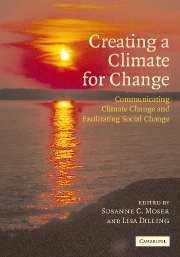Book contents
- Frontmatter
- Contents
- Preface
- Foreword
- List of contributors
- List of tables
- List of figures
- List of text boxes
- Introduction
- Part I Communicating climate change
- 1 Weather or climate change?
- 2 Communicating the risks of global warming: American risk perceptions, affective images, and interpretive communities
- 3 More bad news: the risk of neglecting emotional responses to climate change information
- 4 Public scares: changing the issue culture
- 5 The challenge of trying to make a difference using media messages
- 6 Listening to the audience: San Diego hones its communication strategy by soliciting residents' views
- 7 The climate-justice link: communicating risk with low-income and minority audiences
- 8 Postcards from the (not so) frozen North: talking about climate change in Alaska
- 9 Climate change: a moral issue
- 10 Einstein, Roosevelt, and the atom bomb: lessons learned for scientists communicating climate change
- 11 Across the great divide: supporting scientists as effective messengers in the public sphere
- 12 Dealing with climate change contrarians
- 13 A role for dialogue in communication about climate change
- 14 Information is not enough
- Part II Facilitating social change
- Part III Creating a climate for change
- About the authors
- Index
- References
11 - Across the great divide: supporting scientists as effective messengers in the public sphere
Published online by Cambridge University Press: 20 August 2009
- Frontmatter
- Contents
- Preface
- Foreword
- List of contributors
- List of tables
- List of figures
- List of text boxes
- Introduction
- Part I Communicating climate change
- 1 Weather or climate change?
- 2 Communicating the risks of global warming: American risk perceptions, affective images, and interpretive communities
- 3 More bad news: the risk of neglecting emotional responses to climate change information
- 4 Public scares: changing the issue culture
- 5 The challenge of trying to make a difference using media messages
- 6 Listening to the audience: San Diego hones its communication strategy by soliciting residents' views
- 7 The climate-justice link: communicating risk with low-income and minority audiences
- 8 Postcards from the (not so) frozen North: talking about climate change in Alaska
- 9 Climate change: a moral issue
- 10 Einstein, Roosevelt, and the atom bomb: lessons learned for scientists communicating climate change
- 11 Across the great divide: supporting scientists as effective messengers in the public sphere
- 12 Dealing with climate change contrarians
- 13 A role for dialogue in communication about climate change
- 14 Information is not enough
- Part II Facilitating social change
- Part III Creating a climate for change
- About the authors
- Index
- References
Summary
Is it enough for a scientist simply to publish a paper? Isn't it a responsibility of scientists, if you believe that you have found something that can affect the environment, isn't it your responsibility to actually do something about it, enough so that action actually takes place?
Mario Molina (2000)Most breaking science stories have a news lifespan of a few days before they retire, relegated to the pages of arcane journals. But there was one science story in 2004 with a far longer – and wider – news cycle than many. In the world of climate science, this story broke ground in several areas: it delivered a range of the latest climate model simulations, compared higher- and lower-emissions scenarios, and calculated the resulting impacts for a specific region.
On August 16, 2004, the Proceedings of the National Academy of Sciences (PNAS) published a report on the possible future of California's climate (Hayhoe et al., 2004). Authored by a team of 19 scientists, the report highlighted two sets of scenarios representing higher and lower pathways for future emissions. The study's authors found that, under the higher-emissions scenario, California's average summer temperatures could warm by between 9 and 18 °F – twice as much as in the lower scenario – by the end of the twenty-first century. In this higher-emissions scenario, Californians could expect up to eight times as many heatwave days, with heat-related mortality rising significantly.
Information
- Type
- Chapter
- Information
- Creating a Climate for ChangeCommunicating Climate Change and Facilitating Social Change, pp. 180 - 199Publisher: Cambridge University PressPrint publication year: 2007
References
Accessibility standard: Unknown
Why this information is here
This section outlines the accessibility features of this content - including support for screen readers, full keyboard navigation and high-contrast display options. This may not be relevant for you.Accessibility Information
- 10
- Cited by
